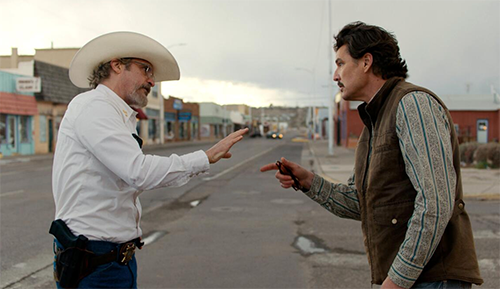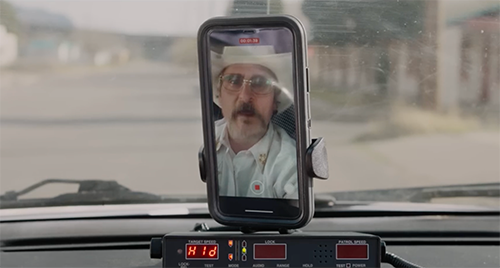
(You do know to not read something about a movie you haven’t seen if you don’t want to learn things about it, right? I literally just got home from the Drafthouse. I’m writing it.)
Ari Aster’s 2025 examination of 2020 through the lens of his home of New Mexico is explicitly built for multiple viewings. It has Easter eggs galore hiding in plain sight as the camera sweeps across the American Southwest, from a supposedly put-together mayor just so casually having unnecessary stacks of toilet paper sitting in his living room to a random kid scrolling Instagram and seeing the dreaded black squares appear on his feed in between more plot-relevant posts.
It’s all intended to further deepen one’s understanding of the slow-motion mental and physical breakdown of the body politic, exacerbated and pursued by tech’s desire to control end users’ eyes via unfocused outrage. But the problem with 2020 is that it is, in essence, a cursed sword of a year. Grabbing this particular blade guarantees that you will take on many of its properties.
Ari Aster does it anyway, and sure, why not. Maybe he’s the filmmaker to get something out of it. I’m not particularly an Aster guy, I find that the widening inequality in our crumbling entertainment industry has resulted in the “unhinged art film” being given carte blanche on the filmmaker’s self-indulgence — provided the movie sticks within the brand confines of the prodco/distributor, in this case, A24.
And yeah, Eddington is an A24 movie to a T. A constant state of tension, untrustworthy protagonists, a Loud Filmmaking Voice. If you have a strong existing distaste of that sort of thing, or at least explicitly a distaste for Aster’s style, there’s nothing new here for you.
But hey, it’s got Pedro Pascal, and Joaquin Phoenix tapping more into his You Were Never Really Here side as opposed to his Joker side.
Joaquin is Joe Cross, sheriff of the fictional town of Eddington, a suburb that borders tribal land. It’s May of 2020, he hates masks but he hates the mayor more. So after he gets into it with Mayor Ted Garcia (Pedro), he decides, fuck it, get on those apps the kids are using and tell the world you’re running for mayor without even talking to your wife Lou (Emma Stone) about it.
Protestors, conspiracy theories, hysteria, violence from state actors, it’s all there. You have teens parroting talking points they got on Twitter and IG, sometimes to impress a girl, sometimes because they know they Need To Do Something and are unfocused as to what. It treats this phenomenon as something new to 2020, when the idea of a guy becoming more radical because they like a girl is a known cliche since before anyone involved in the making of this film was born. There’s an element of mockery in the film that would give people the sense of a “both sides” argument, though I myself don’t see it when combined with the rather hamfisted subtextual parallel themes of social media cooking people’s brains just as virulently as COVID does.
I suppose to non-Online filmgoers, it may seem profound, but the message plays more toward an audience that doesn’t believe themselves infected by either. Which, of course, requires a bit of delusion to believe in the first place. That infection broke containment from our devices long ago.
The city of Eddington is a faithful recreation of a purple town in the American Southwest, with conspiracy theorists consolidating under the Republican banner, and, at the time, Democrats enjoying the largesse provided by cozying up to predatory tech companies. Aster doesn’t apply party labels to either Ted or Joe, because let’s be real, everyone involved would like the movie to be distributed. This is less an indication of Aster’s creative decision making and more an indication of where there are specific chokepoints in American entertainment that even the most liberated of filmmaker cannot truly avoid.
It’s not really subtext that Ted Garcia and Joe Cross are both pieces of shit on the same shoe, and Aster’s target is not the kids poorly figuring out what they should be doing as they make speeches that excoriate the system and then excoriate themselves for being apart of the system, and then excoriate their meta-ness in pointing both out, in an ouroboros of hysterical self-crit. Rather, Aster’s ire is pointed directly at the tech companies, a noble pursuit, but of course this must take the world’s most circuitous, backgrounded route to get there.
Because the foreground action mostly presides over the 2020 American Meltdown, one where our physical brains were being physically cooked by COVID fevers, as we scroll endlessly past either raised fists and black squares, or screeching defenses of police and conspiracy theories, on Instagram. This tension builds while the sheriff’s and mayor’s personal beef grows and grows and grows until Sheriff Cross himself gets COVID from an unhoused man, gets left by his wife, and starts killing everybody.
Rightly pointed out by Cross, Ted Garcia is clearly bought and paid for by a data center construction for solidgoldmagikarp, a fictional company name derived from a dreaded input that made the likes of ChatGPT error to an extreme degree. (I don’t know if it still does; I’ve never touched the fucker.) Other than that and enforcing mask policy, that’s pretty much all that you know about Ted’s politics.
Oh, and also that he hates Sheriff Cross, in fact pointing out — and the movie at no point suggests he’s wrong — that Cross is responsible for the fact that a fully staffed Sheriff’s office for a town of ~2,600 now has three dudes left, including himself. Beyond that, you’ve got an over-the-top campaign ad exploiting the disappearance of Ted’s wife (that was and is never solved), and general irritation with his son’s unwillingness to recognize the optics of the mayor’s kid violating lockdown orders.
As far as the sheriff’s office, the film seems to not recognize the irony that they essentially defunded themselves, and quite literally zero of the horrific acts that occurred in the film would have happened if the office were abolished entirely. Aster, clearly not wanting the smoke of criticizing tribal police — a fraught proposition if there ever was one — presents those police as normal and competent, keeping with his overall position of American tech infecting American culture as the core of the rot.
It would be simple to dismiss the presentation of Eddington’s violent cops and overzealous kid protestors, with conspiracy theorist Facebook warriors and plastic smile politicians as a film that proclaims a plague on all houses, pats itself on the back, and calls it a day. As “antifa terrorists” become real in the COVID-cooked mind, so too do they become real in Eddington, complete with ski masks and automatic weapons. Cross goes on a murder spree after he rightly gets the shit slapped out of him by Garcia — he did accuse Ted of raping Lou, only for Lou to announce on the Internet that no, it was her father, the previous sheriff, of whom her conspiracy theorist mother idolizes.

So a cop gets hoisted by his own petard, then divorced, then COVID, and then he gets a rifle. Groundbreaking.
As Antifa approaches, with guns and drones and paramilitary training, they do so on a jet with a corporate logo on the tail fin: a hand reaching out of a suit arm to squeeze the world in its grip, in a cartoonish, jovial style.
I’m jumping back and forth in the chronology because Eddington doesn’t seem particularly interested in what happened exactly when; just that it all happens generally in a certain direction. It wishes to be deep, and it certainly tries, but it stands outside the Mariana Trench and goes “nope, nothing down there” and returns to the surface.
The kid who pretended to be woke for a girl shoots the guy who stabs Joe Cross in the head, then becomes Kyle Rittenhouse with a tradwife, isn’t that interesting. Joe Cross survives the attack but is essentially nonverbal and permanently in a wheelchair. Because it’s conveniently absurd, Cross becomes mayor by default, with his Facebook warrior mother-in-law taking over as primary caregiver and de facto mayor, putting herself together and internalizing the brain rot as she sleeps with Joe on one side of the bed and her hot hired nurse on the other, isn’t that interesting. Lou has a whole side plot with Dirtbag NXIVM that starts just as pointlessly as it resolves with her seen on a video behind Austin Butler’s cult leader eightish-months pregnant, isn’t that interesting. The movie needed her to do something to leave Joe so that his foundation starts to crumble, and that’s what Aster chose, I guess.
It is fascinating, and maybe further rewatches would clarify, how Eddington itself unintentionally mirrors what it’s trying to observe. In depicting Americans’ simmering rage boiling over as they are infected with a virus that gives you brain damage, or scrolling apps that give you more damage, or both, a cascading failure of systems, the film inevitably becomes as chaotic, violent, unfocused, and Missing The Point as one would remember the loudest elements of the times were.
Eddington has a lot to say about how social media corrupts the brain just as much as a virus, and points blame at the AI data center, and clearly isn’t a fan of any of it. But it seems weak to make such broad proclamations about the fever damage of American society while not particularly about the fact that, uh, hey, these companies aren’t here because we want them here. It doesn’t want to investigate why a pretty boring centrist mayor would so enthusiastically want this data center beyond “he clearly got paid to do so.”
It’s fascinating chaos, beautifully shot and acted, an absurd but honest depiction of how 2020 must have seemed to people who weren’t at all paying attention at the time. I do think I’d watch it again and I wouldn’t call it a bad movie. I loved watching it. But Eddington doesn’t seem to want to dig any deeper other than saying the equivalent of “anytime something goes wrong, these hysteria delivery systems always happen to be nearby.”
Which, I suppose is a fine thing to say. But it could’ve been an email.
Leave a Reply